There is an unspoken assumption among some connoisseurs of American pre-Code cinema that the shocking freedom these films enjoyed was somehow linked to a progressive attitude toward social mores. The willingness of filmmakers and studios to take on such "forbidden" subjects as drug addiction, abortion, sexually liberated women, racial issues, and what have you might suggest that the filmmakers and the studios were in the forefront of social and moral progress. This is a mistaken assumption. While it is true that the Hays Code absolutely was a mechanism for conservative social engineering, that doesn't mean that every film that flouted it was on board with an opposing viewpoint. Sometimes, filmmakers used their freedom to demonize that very freedom. No one could have accused a filmmaker like, say Cecil B. DeMille of being socially liberal, and it was one of his films that more or less brought about the end of the pre-Code era. Films like Female, Baby Face, Call Her Savage, or Torch Singer were all retrograde critiques of the sexual liberation of women hiding behind their sexual frankness and racy imagery, with many of their "liberated" heroines repenting and eventually settling for their more "natural" roles as wives or mothers. While this narrative was often played ironically with its fingers crossed behind its back, sometimes it was in deadly earnest. One such deadly earnest version is found in A Free Soul from MGM in 1931, directed by Clarence Brown. It's a film whose only brush with irony is its title. No one in the film is free and that's the way the filmmakers like it.
The story in A Free Soul follows the fortunes of one Jan Ashe, the wild child daughter of famous defense attorney Stephen Ashe. Jan is engaged to be married to the respectable Dwight Winthrop, who adores her, but her eye is diverted by one of her father's clients, the gangster Ace Wilfong. She has a taste for the bad boys. After her father successfully defends Wilfong on a murder charge, Jan begins seeing him behind everyone's back, eventually breaking it off with Dwight. Meanwhile, her father is drinking himself to death. Both Jan and her father have become persona non grata to their upright and uptight extended family, especially after she throws over Dwight in favor of Ace. She has no intentions toward Ace, though, beyond having a good time at his club and in his bed. Ace has other ideas and when he demands that she marry him, and when her father subsequently finds her in Ace's apartment after an altercation at Ace's speakeasy, Jan realizes that she's made a dreadful mistake. She flees with her father, taking him into the mountains to dry him out and get her own head straight. When she returns, Ace repeats his demand for marriage, with the threat of kidnapping behind it. She confides in Dwight, who is still devoted to her in spite of her refusal. When Ace makes good on his threats, Dwight goes to Ace's office and shoots him. Meanwhile, Stephen has vanished. Jan's fresh air cure hasn't taken and Stephen has descended into the very depths of alcoholism. Jan finds him at a flophouse and brigades him in Dwight's defense. The only problem is that Dwight is resigned to his fate. He has no intention of ruining Jan's reputation in society by speaking aloud his reasons for killing Ace. Murder over a gambling debt is a gentleman's problem, after all. But Stephen will have none of that as he mounts his defense...
A year before A Free Soul, star Norma Shearer mounted a campaign against her husband to allow her to play roles in racier films than what she had heretofore been given. Her husband was Irving Thalberg, the head of production at MGM, and if ever there was a producer who had some elevated opinion of his actress wife's image, it was him. Shearer, however, was not to be denied. The specific film she coveted was The Divorcee. Thalberg was adamant that she would not star in that film, so she staged a guerilla campaign to get her way. Hollywood legend has it that Shearer had some boudoir photographs taken by one of the glamour photographers at MGM and left them on Thalberg's desk, even as she began to rehearse scenes from The Divorcee with its director before ever being cast. After Thalberg relented, the film became a big hit and Shearer won an Oscar for it. Thalberg put up no opposition to her part in A Free Soul. There's another Hollywood legend attached to this film. The part of Jan Ashe was also coveted by Joan Crawford, who was then coming into her own as a movie star. Crawford bitterly resented Shearer, believing that the fix was in when it came to plum roles. "She sleeps with the boss. Who can compete with that?” she remarked with this film in mind, though she probably didn't use the phrase "sleeps with." Crawford regarded Shearer as an enemy from then on. Would Crawford have done better in the role? I don't know. Maybe. Maybe not. At the time, MGM had her slotted into an endless series of plucky shop girl roles, much to her chagrin. Certainly, she played well against Clark Gable in many subsequent films. Contrary to another one of Crawford's complaints, Shearer could act, and in this film she pulls out the stops. For the second year in a row, she was an Oscar nominee.
This is the last film in which Clark Gable was ever a supporting player. It's the film that made him a star and two years later, he was the king of Hollywood. Had he been at Warner Brothers in the early 1930s, he would have been one of the great gangster actors, a la Cagney, Robinson, or Bogart. MGM was never very interested in gangster films and this film isn't really in that genre, but for all that, Gable is one of the most charismatic and menacing gangsters from the period. You can absolutely see why a "good" girl like Jan Ashe would be attracted to him. Because he was at MGM, though, he wasn't handcuffed to this image and at the peak of his stardom in the 1930s he played journalists, cowboys, naval officers, aviators, and Rhett Butler. Above Gable in the cast list was Leslie Howard, who has the thankless role of Dwight, and given the choice between the charismatic Ace and the lovelorn sad sack Dwight, it's no wonder that Jan gets herself into trouble. Who wouldn't get into trouble.
Lionel Barrymore was the only one of the Barrymores who ever won an Oscar and it was for this very film, playing the dipsomaniac defense attorney Stephen Ashe, a role that combines two of the Academy's favorite performance elements: the addict and the courtroom savant. This film indulges Barrymore as both a drunk and as a lawyer, sometimes in the same frame, and gives him a thorny moral problem to wrestle to boot. He feels responsible for his daughter's dalliance with Ace Wilfong. He feels responsible for the murder rap Dwight seems hellbent on copping. He feels responsible for wrecking his family through his own moral turpitude. And boy howdy does Barrymore ACT all of this with capital letters. This is a performance that Barrymore cannibalized throughout the 1930s--there are certainly elements of this performance in his turn in Grand Hotel the following year--and maybe there are elements of Barrymore's own addictions here, too.
I've had a run of lousy pre-Code films recently. A lot of those films are salacious, sure, but they're also shackled by the limitations of the switch to sound. Some of them have completely stilted performances from actors who should know better or who were sabotaged by directors who didn't know what to do with dialogue. Some of them are basically filmed plays on a limited number of sets. Some of these limitations dog A Free Soul. It sometimes feels stagebound, particularly in scenes between Shearer and Gable. But sometimes it comes alive. Director Clarence Brown was Oscar nominated for this film, one of five he earned during his career without ever winning the big prize. He does a good job of moving the film along at a brisk clip. He even indulges in symbolism in his shot compositions, occasionally placing his characters behind bars, both symbolically and literally. Moreover, he makes terrific use of costume design to focus the attention of the viewer where it needs to be. These two shots, for instance, isolate and play up the movie stars in the cast by setting them apart with light colors amid a sea of dark colors. It's a basic cinematic trick, sure, but it's damned effective.
Brown saves a fireworks display for the end with the courtroom scene. In its original conception, Ashe's defense of Dwight was to have been done as a single take, and indeed, it was shot that way with a master shot lasting 14 minutes. If you know the history of long-take filmmaking, you'll probably know that the cameras used in classic Hollywood productions only held 10 minutes of film. This film used multiple cameras on the same mount to get this take in the can. Unfortunately, the studio got cold feet about this and while all of Barrymore's shots during this scene are lifted from this long take, the film interrupts it with inserts focusing on Shearer on the witness stand and Dwight at the defense desk. I'm sure the reasoning for this is that Shearer is the star and the studio wanted to feature her--Thalberg, remember?--but what could it have been if they'd left Brown to his own devices? Regardless, taken in context with the films that are its contemporaries, A Free Soul is pretty well-made. As cinema--as a movie--it still plays well enough. Its main strength is its understanding of movie stars, particularly movie stars who can act for sound. As a social document, however...
The main thrust of A Free Soul is that freedom--particularly freedom for women--is inherently destructive and that the social order is there for a reason. Jan and to a lesser extent Stephen are agents of chaos, and their moral transgressions bring themselves and others nothing but doom. Jan's moral transgressions are sexual in nature. How dare she fuck someone outside the bounds of marriage solely because it brings her pleasure rather than fucking someone whose role as a husband has been prescribed and sanctioned by (high) society? And look where it gets her? Worse, she's fucking a man with the same social demands as her family, a man who enforces his own version of patriarchy with himself at the head through threats violence. Hardly freedom. And Stephen? Well, he's a poster child for that old demon alcohol. Not only does it impair his ability as a father and inhibit him from right actions, it drags him to the grave in the end. This is melodrama at its most conservative, a morality play that's only a few steps away from the hysterics of Christian exploitation films. This film has a conspicuous absence of religiosity, which is probably a good thing because it would tip this over the edge into the ridiculous. Maybe we should be thankful for the Jewishness of Thalberg and Louis B. Mayer. Ultimately, this is a film that not only suffers from the shifting social mores of the subsequent century, it may very well have been hopelessly old-fashioned even in its day. All of which subverts the good things that are definitely present in the film. What's really surprising about this, though, is that its moralizing was completely lost on the Breen office when MGM submitted A Free Soul for re-release in 1936. No cuts were suggested to comply with the code and no approval was forthcoming. So into a vault it went, where, unseen for generations, its prestige faded over the years. What this proves, in addition to the idea that no good deed goes unpunished, is that censors are literal-minded to a fault, a fact sometimes exploited by subsequent filmmakers.
As a personal experience: I had a good time watching this film in large part because Norma Shearer's career is a blank to me. I've only seen a small handful of her films so there's a process of discovery for me that is pleasurable outside the bounds of the film itself. In this film I find that, far from being an actress whose career flourished due to nepotism, she was an actual movie star. Gable I knew already, but it's fun watching his own star ignite here. But this film also reinforces my own skepticism about the pre-Code era. There are a lot of great films from the period and a fair few that are still genuinely transgressive--even at staunchly conservative MGM. But as in our present era, freedom doesn't mean what you probably think it means.

This blog is supported on Patreon by wonderful subscribers. If you like what I do, please consider pledging your own support. It means the world to me.
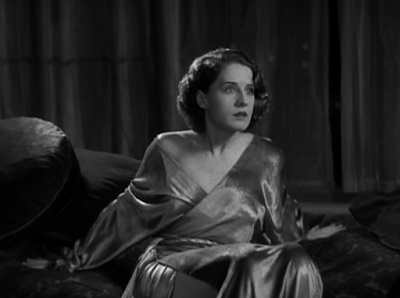
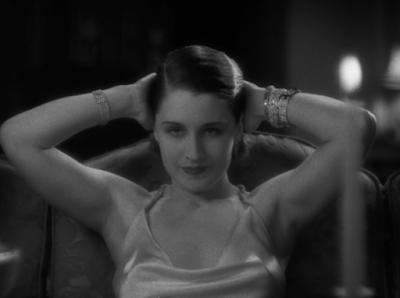
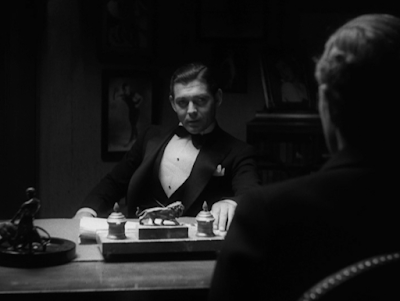

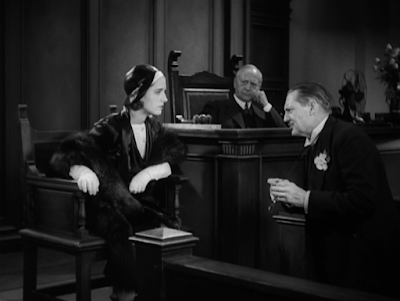


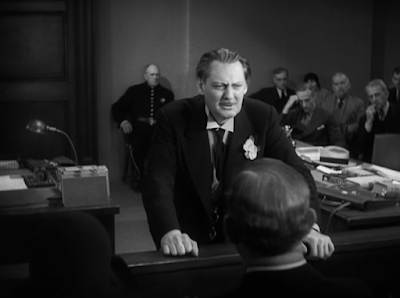

No comments:
Post a Comment